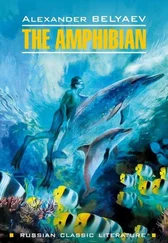This caused quite a rustle in the hall.
“In 1915, in fact very shortly before I left for the front,” Salvator went on, “I happened to effect a slight improvement in the worthy bishop’s organism by cutting out his appendix, that useless and risk-ridden appendage of the caecum or, in popular parlance, blind gut. On my surgeon’s table my priestly patient did not raise any objections to the sacrilege I was about to commit by cutting out part of his body made after God’s image. Can you deny that?” Salvator asked the bishop looking straight at him.
Juan de Garcilaso, a faint flush mounting to his pallid features, sat stock-still, his thin fingers, clenched in his lap, trembling slightly.
“And wasn’t there another case at the time I still had my practice? Hadn’t I a visit, and a request to be rejuvenated, from our respected prosecutor, Sr. Augusto de-”
The prosecutor leapt up in protest but his words drowned in loud laughter.
“I would ask you to keep to the subject, please,” the presiding judge said with asperity.
“That would be best asked of the indictment’s authors,” said Salvator. “It was they who gave this turn to the case in the first place. Apparently certain people here cannot reconcile themselves to the idea that they, like everybody else, are monkeys or even fishes able to speak and hear only because their gill arches have developed into organs of hearing and speaking. Well, not exactly monkeys or fishes, to be sure, but their close descendants,” and turning to the prosecutor, who was showing all signs of impatience, Salvator said, “Calm yourself; I do not propose to give a talk here on the theory of evolution.” Then, after a pause, he went on, “The trouble with man is not that he has descended from the animal, but that he has not ceased to be an animal, vicious, rude, unintelligent. My learned colleague could have spared you his frightening discourse on embryonic development. For I have never had recourse to influencing embryos or crossing animals, for that matter. I’m a surgeon and a surgeon’s knife has always been my only instrument. Surgery often involves transplantation. So, to try and improve on the methods used, I started experimenting on animals. My ultimate aim was the replacement of man’s diseased organs and limbs.
“The operated animals I kept in my laboratory, studying the behaviour of organs and limbs often transplanted into environments entirely new for them. When my observations were over, the animals were transferred to the garden. This is the way my zoological gardens came to be built up. I was especially keen on transplanting tissues and organs between far-removed species, those of fishes and mammals, for instance. And in this particular field I’ve achieved what contemporary scientists still think impossible. But is it, really? I hold that what I alone can do today the run of surgeons will be doing tomorrow. Professor Stein perhaps knows of the latest operations performed by the German surgeon Sauerbruch, who succeeded in substituting a sound shin-bone for a diseased thigh-bone.”
“Yes, but what about Ichthyander?” asked the expert.
“Ah Ichthyander, now Ichthyander’s my special pride. In his case the difficulty lay not so much in the technique as in the need to change the major functions of a human organism. Half a dozen monkeys were sacrificed in preliminary work before I became quite satisfied in my own mind that I could safely operate on achUd.”
“What was the nature of the operation?” asked the presiding judge.
“I transplanted a young shark’s gills onto a child which enabled him to live both on land and in water.”
There were exclamations of surprise among the audience. The reporters present rushed outside to phone the news to their editors.
“Later on I was even able to improve on my original success. The amphibious monkey-my latest result — can live indefinitely long in either element at no risk to health. Now Ichthyander cannot stay outside water for more than three, or at the most, four days in succession. Long stays on land tend to overtax his lungs and dry up his gills, the first sign of this being shooting pains in his sides. Unfortunately in my absence Ichthyander went off his regimen. He used his lungs a great deal too often with grievous results. The balance is upset and the amphibious man is turning into a human fish. In Ms present condition he has to spend most of his time in the water.”
“How did you arrive at the idea of creating an amphibious man and what was your object in doing so?” the prosecutor said, having asked for and received the judge’s permission.
“The same idea prompted me: that man is not perfect. Having gained a great deal through evolution as compared to his animal ancestors man has lost much in the process. Living in the water, for instance, would provide an immense advantage for man. And indeed, why shouldn’t he enjoy this advantage? We know from the theory of evolution that all the land animals now existing have evolved from water animals. And we also know that some of the land animals went back later. The dolphin was a fish originally, then came on land and became a mammal, only to return to the water later though remaining a mammal, just like the whale. They both breathe with lungs. A dolphin can also be made into an amphibian. In fact that’s what Ichthyander was asking of me so that his friend — a dolphin — could stay longer with him under water. And I was going to perform the necessary operation. Ichthyander — the first fish among men and the first man among fish-couldn’t help feeling lonely. Now it would be quite different if many more people followed his example. That mighty element-water-would then lie conquered at man’s feet. I’d like to give you a glimpse of its might. As much as three-quarters of the earth is covered by water. But that’s only surface. Men could settle the ocean in layers. Thousands of millions of men would have ample accommodation as well as an inexhaustible supply.of food and raw materials close to hand.
“And take the ocean’s power potential. It is a known fact that the ocean waters take up the equivalent of 79,000 million HP in solar energy. But for air heating and other leakages the ocean would have been boiling long ago. What use does man put this practically unlimited store of energy to? Almost none at all.
“And what about the power of ocean currents? The Gulf Stream and the Florida Current alone carry between them 91,000 million tons of water per hour, about 3,000 times as much as a major river. Add to this the power of the other ocean currents. What use does man put this power to? Again almost none.
“And what about the power of ocean waves and tides? You should know that a wave can have a striking force of three and a half tons per square foot, can reach as high as 142 feet and lift with it as much as one thousand tons, say, of rocks; that the highest tides touch the fifty-five-foot mark. What use does man put these forces to? Once again almost none.
“On land man cannot go very high above the Earth’s surface or very deep below it. In the ocean life goes on everywhere-from North Pole to South, from surface to bottom.
“What use do we put all this unlimited wealth to? We catch fish-and that only goes skin-deep, as it were, leaving the greater depths untapped; we collect sponges, coral, pearls, weeds-and that’s about everything.
“We do some submarine work by way of erecting piers for bridges and dams and refloating sunken ships. And even that is done at the expense of hard work and risk, and often loss of life. But then what can you really expect of man if two minutes underwater is enough to kill him?
“Now it would be quite a different proposition if man could live and work underwater. Without diving suits or canned oxygen. The fabulously rich deposits he would then discover! Ichthyander told me once — no, I don’t want to conjure up the ogre of human avarice. He used to bring me samples of rare metals and ores he picked up on the sea-bed. The samples were small but the deposits might have been immense.
Читать дальше
Конец ознакомительного отрывка
Купить книгу










